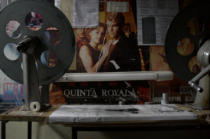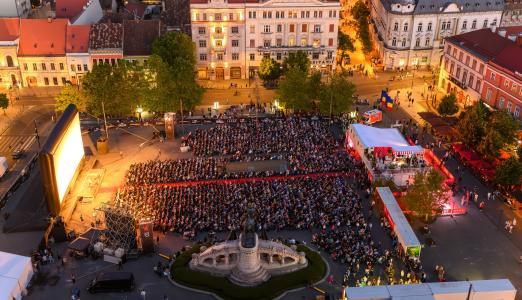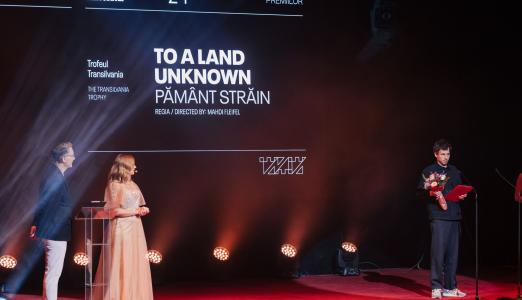„Save the Big Screen!” Campaign Has Begun
Romanian Film Promotion (APFR), supported by Transilvania international Film Festival (TIFF), has just started a large campaign, Save the Big screen, meant to stop the phenomenon of the disappearance of various cinemas throughout the country.

An interactive website, www.salvatimareleecran.ro, a documentary titled Cinema, mon amour, crowd-funding campaigns, a country-wide traveling cinema, a special film program within TIFF, as well as seminaries and debates with various specialists from Central and Easter Europe are only some of the courses of action undertaken by this campaign.
Now, Romania is the European country with the fewest screens per number of inhabitants. If, in 1990, there were approximately 450 cinemas, today only less than 30 are still up and running. In less than 20 years, the number of viewers dropped 50 times from the 90s and less than 10 theaters were upgraded. 78% of the cities have no functional cinema. Romanian and European films, although appreciated and awarded in the major festivals, fail to reach the Romanian audience due to the acute shortage of cinemas as alternative to the commercial film oriented multiplexes.
"In the past 20 years, cinemas have turned, one by one, in bingo halls, exchange houses, places of worship, clubs, supermarkets, fast food joints, furniture stores, wedding oriented restaurants. The blunders have been huge; the cinemas have been passed, back and forth, between RomaniaFilm and municipalities. Now, the problem of the cinemas is like a ball going around from one government to the next, but nobody takes trenchant decisions", says Tudor Giurgiu, APFR president and campaign initiator.
The Save the Big Screen! campaign is designed to make the responsible authorities and the public responsive to the possibility of restoring, preserving, renewing and reusing the already existing but unused cinemas. "The campaign has a specific target. We aim to have, in the next two years, at least a network of five or six upgraded cinemas. The municipalities should work alongside cultural managers and NGOs interested in the transformation of such places – now dead – into modern, digital cinemas, places that can accommodate various events of interest to the local communities", adds Tudor Giurgiu.
A first public fundraising campaign, using the crowd-funding platform www.we-are-here.ro will be soon launched for one of the theaters in need of upgrading and new equipment in order to rejoin the circuit.
The interactive website www.salvatimareleecran.ro identifies the network of state-owned cinemas. The information on the site was collected from cinema employees throughout the country personal archives, RADEF Romania Film, blogs and websites created by enthusiasts who were concerned about the fate of these cinemas. The links to each of these websites and blogs are posted next to the cinema they mention and talk about. The platform users are encouraged to contribute with photos or video materials and to tell stories that bind them to those particular cinemas.
From May 31 to June 1, TIFF 2014 will host a workshop about accessing funds for cinema rehabilitation as well as the presentation of successful projects that helped renovate and update, technically speaking, cinemas in Poland and Croatia. In addition, a special TIFF section will highlight films that talk about the love for the big screen. Among them, Cinema at the End (by Meritxell Soler, Julián Vázquez), a road movie in which a young girl travels from her hometown to the end of the world, in Argentina, to discover how and why cinemas disappear, and The Last Remaining Seats (by Mario Piperides, Greece-Cyprus), a documentary about the efforts of two men to reopen the cinema in their village.
Another support for the campaign comes in the form of Alexandru Belc's (8 March) Cinema, mon amour, a documentary that analyzes the reasons behind the degradation of the cinemas and follows the destiny of the people who worked in them, providing an up-to-date portrayal of both the functional and abandoned cinemas in the entire country. The film will premiere at TIFF 2014; later on, there will also be a caravan which will bring the film to several Romanian cities.





